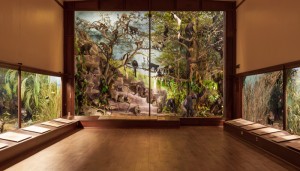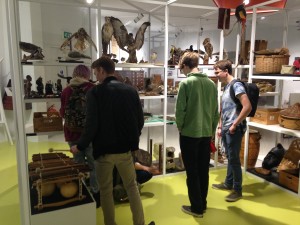On the last day of Welcome Week 2015, a group of students from the School of History visited the Powell-Cotton Museum at Quex Park, to explore its extensive and fascinating collection. Major Percy Powell-Cotton established the Museum in the early twentieth century to house his vast collection of taxidermied animals and ethnographic artefacts, collected over a lifetime exploring Africa and Asia. The Museum also houses the anthropological collections of his daughters, Dr Diana and Antoinette Powell-Cotton.

The School of History has been working with the Powell-Cotton Museum at Quex Park for a number of years, particularly through the School’s Science, Communication and Society MA programme. Most recently, the School has been developing its relationship with the Museum, with a view to expanding the ways in which students can carry out research into the Museum’s collections, and to create opportunities for students to undertake work experience placements at the Museum to develop their employability skills.
This relationship has culminated in the School purchasing a formal membership of the Museum, extending to all students and staff. Students are able to visit the Museum for free, and receive a discount on bench fees when conducting research in the Museum’s archives.
To celebrate the beginning of the School’s membership, and the start of the academic year, a group of students headed to the Museum on 25th October, and were given a tour of the Museum’s collections and a talk about its history and development by Manny Mvula, the Museum’s Conservation and Outreach Officer (who was the subject of some media attention last year after a video of him confronting a charging elephant in Zambia was uploaded to YouTube).
The Museum’s collection of animals offers a fascinating insight into the history and evolution of conservation. It may seem counter-intuitive today, but Major Powell-Cotton considered himself a conservationist, and kept detailed records on the animals he hunted, their environments and behaviours, as well as on the indigenous groups he encountered in Africa and Asia.

The School will continue to work with the Museum in order to bring opportunities for volunteering and work experience to students. Staff from the Museum’s Learning and Outreach team will even be visiting the University to deliver a session on Community Engagement and Learning as part of the University’s Employability Festival (see the Careers and Employability Service’s website for more details).
Quex Park can be reached from Canterbury via car (25 minutes from campus), or on the number 8 bus from Canterbury Bus Station. For more information about the School’s membership and how to engage with the Powell-Cotton Museum, please contact Jon Beer (J.Beer@kent.ac.uk).

